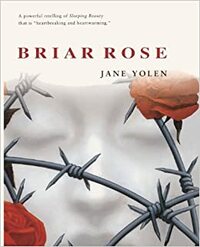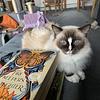You need to sign in or sign up before continuing.
Take a photo of a barcode or cover
Good recommendation for teens. Holocaust survivor story, so mature themes.
Book #16 Read in 2018
Briar Rose by Jane Yolen
This is a retelling of Sleeping Beauty with a holocaust twist. It could appeal to both historical fiction readers and those who like fairy tales. Becca is looking into the past of her recently deceased grandmother who survived the holocaust. Becca heads to Poland to find answers....will she?
Briar Rose by Jane Yolen
This is a retelling of Sleeping Beauty with a holocaust twist. It could appeal to both historical fiction readers and those who like fairy tales. Becca is looking into the past of her recently deceased grandmother who survived the holocaust. Becca heads to Poland to find answers....will she?
dark
emotional
informative
sad
medium-paced
Plot or Character Driven:
A mix
Strong character development:
Yes
Loveable characters:
Yes
Diverse cast of characters:
Yes
Flaws of characters a main focus:
No
A beautiful work about an ugly piece of history.
When Becca’s grandmother dies while proclaiming that she is in fact Briar Rose, Becca decides to hunt down the history of her family, specifically the secret history of her Gemma. Gemma was very secretive about her past, though she constantly told her children and grandchildren the fairy tale of Sleeping Beauty with variations from the version commonly known. Becca only has a box and its contents to aid her in finding out the family secret and she is slowly able to piece the mysteries surrounding her beloved Gemma together. Holocaust literature. Very entertaining and moving. Gives an account not only of how the Jews were persecuted during WWII but also of the other groups that are more often not recognized in popular literature. Highly, highly recommended.
Very moving story. At times the writing felt a little forced to me, but I was carried along by the story and had a hard time putting the book down. The intertwining of the two stories - Briar Rose and the Holocaust - was really brilliant.
I have to admit when I first picked up this book I was mostly curious as to how the tale of Sleeping Beauty would be woven into a book about the Holocaust.
I didn't immediately love the story, though, I did enjoy the trade off between past telling of the fairytale and present, but I was slightly put off by some of the characters. Becca was a little flat for me, but not totally unlikable. I found her sisters, Sylvia and Shana, a bit too self-absorbed and was turned off by that - especially when they were visiting their dying grandmother, Gemma, but as the story began to pick up, I was able to cast those feelings aside and really get into the story.
I thought the Castle section to be the most interesting part of the book, though it was often times hard to read because of the horrible things that were being done by the Nazis. I had to take a few breaks while reading because of that.
I thought the way in which the story was told was done very well. I thought it was clever of Yolen to bring in Josef's character and allow him to tell his story and let that lead into an explanation of Gemma's past.
Overall, I thought it was an excellent and powerful story.
I didn't immediately love the story, though, I did enjoy the trade off between past telling of the fairytale and present, but I was slightly put off by some of the characters. Becca was a little flat for me, but not totally unlikable. I found her sisters, Sylvia and Shana, a bit too self-absorbed and was turned off by that - especially when they were visiting their dying grandmother, Gemma, but as the story began to pick up, I was able to cast those feelings aside and really get into the story.
I thought the Castle section to be the most interesting part of the book, though it was often times hard to read because of the horrible things that were being done by the Nazis. I had to take a few breaks while reading because of that.
I thought the way in which the story was told was done very well. I thought it was clever of Yolen to bring in Josef's character and allow him to tell his story and let that lead into an explanation of Gemma's past.
Overall, I thought it was an excellent and powerful story.
My problem, really, might be a silly one. Because Holocaust books are nearly all, nearly always heavy-handed. But this one? Is really, really heavy-handed
Also, the scenes with the sisters are so over-the-top that they're neither funny nor troubling, just bizarre.
Also, the scenes with the sisters are so over-the-top that they're neither funny nor troubling, just bizarre.
The first hundred or so pages of this novella is really just a frame story for the last seventy. Nevertheless it was fairly compelling throughout, and definitely a meaningful addition to the body of Holocaust literature.
It's interesting that this book was published as fantasy, which it isn't really. Also that it's won awards (and in my library, was labelled, although not shelved) as a YA novel. In her very good introduction to the "Fairy Tale Series" under which this this was published, Terri Windling quotes Tolkien in saying that the fairy tale became the domain of children "primarily because the adults do not want it, and do not mind if it is misused." I think Holocaust literature, and in general the literature of many dark chapters in history, has suffered this fate - if not actually misused, it's something you read when you're young because it's educational, but not something grown people are expected to think about.
Finally, the premise of the book reminded me of the quote, "To write a poem after Auschwitz is barbaric." On one hand, the book shows the process of creating art in response to the Holocaust as being empowering. On the other, how much did the fairy tale thread really add to the story? Yolen says at the end that no woman survived Chelmno and that "happy-ever-after is a fairy tale notion, not history." So is Briar Rose really a fantasy after all? Hmm.
It's interesting that this book was published as fantasy, which it isn't really. Also that it's won awards (and in my library, was labelled, although not shelved) as a YA novel. In her very good introduction to the "Fairy Tale Series" under which this this was published, Terri Windling quotes Tolkien in saying that the fairy tale became the domain of children "primarily because the adults do not want it, and do not mind if it is misused." I think Holocaust literature, and in general the literature of many dark chapters in history, has suffered this fate - if not actually misused, it's something you read when you're young because it's educational, but not something grown people are expected to think about.
Finally, the premise of the book reminded me of the quote, "To write a poem after Auschwitz is barbaric." On one hand, the book shows the process of creating art in response to the Holocaust as being empowering. On the other, how much did the fairy tale thread really add to the story? Yolen says at the end that no woman survived Chelmno and that "happy-ever-after is a fairy tale notion, not history." So is Briar Rose really a fantasy after all? Hmm.
I liked it... but it was sad. There was more than I thought there would be of WWII history, which was fine, except it mainly wasn't based around the life of the character we really wanted to know about. Probably wouldn't read it again. Well-written, though.



